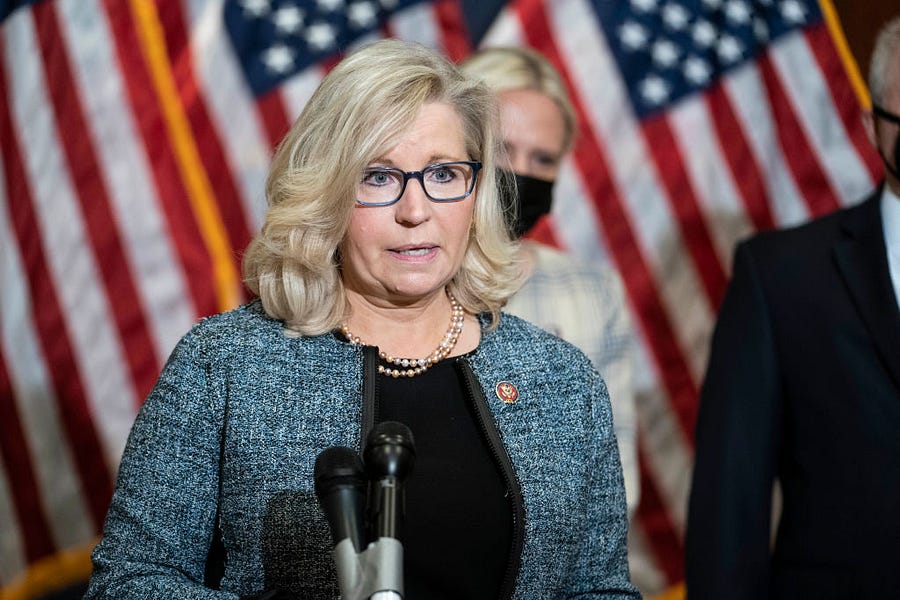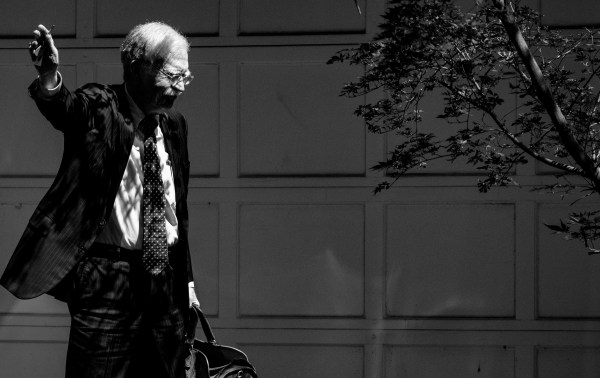ORLANDO—For three days in Orlando, Florida, earlier this week, House Republicans projected confidence about their prospects to retake the House majority in 2022 and downplayed divisions among the conference.
“I think that our message is unity,” said House GOP conference vice chair Mike Johnson.
Many of those in attendance here voiced that tagline repeatedly. But it’s far from the reality. It didn’t take much probing to make it clear that, despite public assurances of a unified front against the Biden administration, deep fissures remain in the House GOP conference.
Members are divided over what role former President Donald Trump should play in the party post-January 6. They’re also at odds over how to address a growing contingent of fringe, conspiracy theory-friendly voices in the conference. The rift reaches to the very top of GOP leadership.
When The Dispatch asked House Republican Leader Kevin McCarthy if he will campaign enthusiastically for the third-ranking House Republican, Liz Cheney, in her re-election race, he demurred. “I haven’t talked to her about it,” he said. Cheney was one of 10 House Republicans to vote to impeach Trump on the charge that he incited the storming of the Capitol. Her firm stance against the former president in the months since has put her at odds with many members of the conference, including McCarthy and other GOP leaders.
When we asked Johnson, the No. 4 House Republican, whether reelecting Cheney will be a critical moment for the future of the GOP, he said: “Oh, we all have our own races to run, I don’t know about that.” And when we asked Gary Palmer, the No. 7 House Republican, about Trump’s ongoing antagonism toward Cheney, he said: “I’m not going to—as policy chairman—let the media try to divide us by bringing in issues relative to any other member of Congress, or to the former president.”
Donald Trump—who lives just a couple of hours from Orlando at his Palm Beach resort, Mar-a-Lago—wasn’t invited to the retreat. But his presence was felt nonetheless.
“I think right now, the Republican Party is headed by Mitch McConnell and Kevin McCarthy in the House,” Cheney told reporters on Monday. “I think our elected leaders, you know, are the ones who are in charge of the Republican Party.”
Unlike Cheney, who has repeatedly pushed her party to distance itself from Trump in the aftermath of January 6, House GOP Vice Chair Mike Johnson embraced Trump’s continued involvement, telling The Dispatch that “there’s a large percentage of the American people that are still very interested in what he has to say.” He predicted Trump will “assist in the ways that he can to help us meet our objective” by helping the House win the five seats they need to retake the majority.
Trump’s participation in the 2022 midterms thus far appears to have one main objective: to purge the party of those who have criticized his behavior in the aftermath of January 6. Earlier this month, the former president said he plans to endorse a pro-Trump primary challenger to Cheney. Trump has also targeted Reps. Anthony Gonzalez and Adam Kinzinger, both of whom voted for impeachment.
He has yet to rally around one candidate in the Wyoming Republican primary. “So many people are looking to run against Crazy Liz Cheney—but we only want one,” Trump said in a recent statement. “She is so far down in Wyoming polls that the only way she can win is numerous candidates running against her and splitting the vote. Hopefully, that won’t happen. I’ll make an Endorsement soon!”
Cheney’s reelection bid could be tough: Trump won Wyoming by 70 percent in 2020, and the state’s Republican Party censured her after her impeachment vote. “I’m anticipating, getting ready for a race that’s going to be a hard fought race,” Cheney told The Dispatch this week. But she added she’s “confident” she’ll win. In the first three months of 2021, Cheney hauled in $1.6 million from a slew of high profile Republican donors, including former Florida Gov. Jeb Bush and even staunch Trump defender Sen. Lindsey Graham of South Carolina.
But as Cheney gears up for the campaign, House GOP leadership members don’t seem particularly enthusiastic about supporting her. Asked about Trump’s expected endorsement of a pro-Trump challenger to Cheney, Palmer said he doesn’t know “how it’s going to impact what Cheney does,” but suggested he’s tired of reporters pitting Republicans against one another.
And Johnson was ambivalent. “I don’t know the politics of Wyoming well enough to comment on it,” he said. “I think everybody’s going to run their own re-election strategy, and I think Liz is doing that. We obviously have had a big difference of opinion when it comes to the former president. … I have to serve my constituents and their interests and she has to do the same.”
McCarthy—intent on retaking the majority and claiming the speaker’s gavel—hasn’t appeared publicly with Cheney since March, and he continues to tiptoe around questions about her reelection campaign.
Asked by Punchbowl News’ Jake Sherman whether he thinks Cheney makes a good fit for the House GOP leadership team, McCarthy said it is a question for the conference and implied that she distracted from the conference’s priorities by discussing Trump during the retreat. “If you’re sitting here at a retreat that’s focused on policy, focused on the future of making America’s next century, and you’re talking about something else, you’re not being productive,” he told reporters on the last day of the Orlando conference.
McCarthy’s tense relationship with Cheney contrasts sharply with Senate Minority Leader Mitch McConnell’s view of her role in the Republican Party. “Liz Cheney is a leader with deep convictions and the courage to act on them,” McConnell told CNN in February. “She is an important leader in our party and in our nation. I am grateful for her service and look forward to continuing to work with her on the crucial issues facing our nation.”
That’s not to say all Republican senators are charmed by Cheney’s political convictions. Sen. Josh Hawley told CNN’s Manu Raju this week that Cheney is “really out of step with GOP voters and members,” adding she “is somebody who has no support in her own caucus, who has hung her own members out to dry over and over … I think she’s on an island.” His remarks came after Cheney suggested Hawley’s role in propping up Trump’s election lies should be disqualifying for a potential presidential bid.
Publicly, House Republican leaders insist they have a good working relationship with Cheney. Asked whether differences of opinion over the former president affects their ability to work together, Palmer pulled the unity card. “I don’t know how to answer that. I think the issue is, are we able to put together a coherent message to move our conference forward and regain the majority, and I think we will,” Palmer said. “I don’t think the issue of whether someone voted for or against impeachment is going to matter.”
Nearly three months after she survived a closed-door, secret-ballot conference vote to boot her from House GOP leadership by a margin of 145-61, Cheney insists she can still work with her leadership colleagues. “We have big differences about [Trump],” Cheney told The Dispatch. “But we’re very united on other areas of substance and policy, and I think we know that’s what we’ve got to be focused on.”
Cheney maintains that the House GOP leadership is united, even though some of her colleagues will not say on the record whether or not they voted to oust her. “We had a closed ballot. And I’ve not talked about that publicly,” Johnson told The Dispatch. “I’m in leadership, I’m the vice chairman of the conference, and again, my job is to advance the interest of them—the full body. So that that’s all I’ve said about that.”
“It was an opportunity for us to talk about how important January 6 was,” Cheney told The Dispatch of the February 3 House GOP conference meeting. “That was really what I was focused on explaining and having exchanges with my colleagues about the grave nature of what had happened and why I and some of our other colleagues voted to impeach.”
Cheney said she was “really pleased” the vote was “as clear as it was.” She maintained that the impeachment vote would have looked dramatically different if it, too, had been a closed vote. “I also think that if the impeachment vote had been a secret ballot, it would have looked much more like the 145-61 vote than having just 10 of us having voted to impeach on our side,” she said.
The Wyoming Republican and her team were confident in their whip count going into the meeting, but for others, it didn’t feel so certain. One House Republican speaking on the condition of anonymity told The Dispatch the outcome was far from clear until the vote occurred late in the evening. “Hearts and minds were changed,” said the member.
“The one thing that struck me in that conference was the joke about her being somebody’s girlfriend,” said the Republican lawmaker, referencing comments from Rep. Mike Kelly, who compared the impeachment vote to a football game during the February 3 meeting: “You look up into the stands and see your girlfriend on the opposition’s side,” Kelly had said. “That’s one hell of a tough thing to swallow.”
Beyond intra-leadership squabbles over Cheney’s reelection bid and impeachment, Democrats say that conference leaders aren’t doing enough to keep the fringiest members of their caucus in line like they did with former Rep. Steve King, who suggested in a 2019 New York Times interview that “white nationalism” and “white supremacy” were not offensive terms. House GOP leaders stripped King of his committee assignments. “We will not tolerate this type of language in the Republican Party,” McCarthy said at the time. “I watched what Steve King said and we took action.”
McCarthy has not, however, taken similar action against fringe Rep. Marjorie Taylor Greene—who said in a 2019 Facebook live video that Nancy Pelosi should “suffer death or she’ll be in prison” for treason. Democrats voted to remove Greene from her committee assignments, but only after McCarthy made clear he would not do so himself.
McCarthy also doled out no consequences for Arizona Rep. Paul Gosar after he spoke at a conference organized by a prominent white nationalist in February.
Some have also questioned McCarthy’s wait-and-see approach to the case of Rep. Matt Gaetz, who is reportedly under investigation by the Justice Department for potential violations of federal sex trafficking and prostitution laws, as well as allegations that he had sex with a 17-year-old girl. Gaetz denies the allegations, saying he has never paid for sex and “as an adult man, have not slept with a 17-year-old.”
The problems aren’t going away. Earlier this month, Punchbowl News reported that several members of the House GOP were considering forming an “America First Caucus” to protect “Anglo-Saxon political traditions” and “work towards an infrastructure that reflects the architectural, engineering and aesthetic value that befits the progeny of European architecture.” The news prompted a tweet from McCarthy that “the Republican Party is the party of Lincoln & the party of more opportunity for all Americans—not nativist dog whistles.”
Pressed on McCarthy’s leadership tactics, Cheney came to his defense. “Kevin did speak out, most recently about the America First Caucus. I think he’s been pretty clear that this doesn’t reflect or represent the party,” she told The Dispatch. “It’s incumbent on all of us, both in leadership—I suppose, especially—but every member to speak out against those kinds of beliefs,” Cheney said when asked about Gosar and the conference he attended. “You can’t sort of accept, or accommodate, or appease it. It’s very important that people speak out against it and condemn it.”
Other members of leadership are quick to defend McCarthy’s big-tent approach. “I think Kevin is providing really visionary and principled leadership in a very difficult political environment,” Mike Johnson told The Dispatch.
Palmer said it’s “somewhat unfair” that some people say the minority leader is not doing a good enough job of keeping members in line. He contrasted McCarthy’s more inclusive approach to leadership to what he perceives to be the heavy-handed approach Democratic House Speaker Nancy Pelosi has taken with her conference. “What [Pelosi] says is law,” he said. “I’m looking at bills that they’re passing that I know some of their members don’t agree with that because they live in mortal fear of their political lives. They won’t cross her. It’s very rare that that happens.”
Palmer said House Republicans “don’t run a dictatorship” like they do on the other side of the aisle. “I don’t agree with everything that some of my colleagues say, but I don’t want us to run the Republican conference like Nancy Pelosi runs the Democrat conference,” he said.







Please note that we at The Dispatch hold ourselves, our work, and our commenters to a higher standard than other places on the internet. We welcome comments that foster genuine debate or discussion—including comments critical of us or our work—but responses that include ad hominem attacks on fellow Dispatch members or are intended to stoke fear and anger may be moderated.
With your membership, you only have the ability to comment on The Morning Dispatch articles. Consider upgrading to join the conversation everywhere.